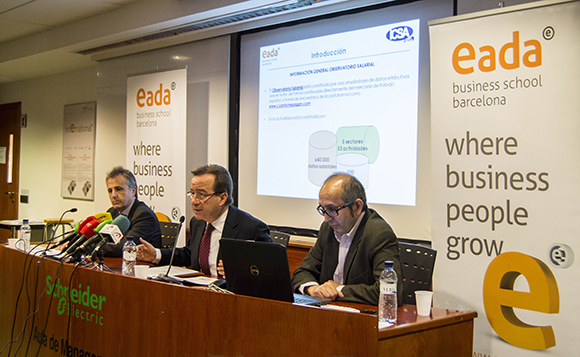The EADA and ICSA Grupo 'Salary trends 2007-2014' survey found a widening gap between manager and employee salaries
- The best paid are managers in the financial sector, who in 2014 reached their maximum historical high –80,925 euros per annum– and those who earn the least, work in the tourism and retail sector–17.000 euros per annum–
- The gross salary of Spanish employees rose 2.11% in 2014, to 21,757 euros per annum, although society does not perceive this change given the precarious state of the job market.
- The experts are in favour of flexible remuneration models in order to guarantee company viability and growth.
EADA and ICSA Grupo have presented the “Evolución salarial 2007-2014” report, which surveyed a sample of over 80,000 salary data of people employed by others in Spain. The main conclusion was that the salary gap between managers, whose purchasing power has increased by 1.64%, and employees or intermediate posts, whose salaries have dropped by 7.83%, “has become chronic” over this period. Proof of this is the gap that exists between managers in the financial sector, the best paid, whose gross salaries have risen by almost 4,500 euros in the last two years –to 80,925 euros per annum in 2014, a historical peak, and employees in tourism and retailing, the worst paid, who last year saw their salaries drop by up to 17,000 euros power annum, earning 11% less-.
On the other hand, if we look at the global figures, the gross salary of Spanish employees last year stood at 21,757 euros, which means a slight increase in employee salaries in 2014, of 2.11%. This percentage constitutes an improvement over the previous year, when employee salaries went down 4.7%.

In this respect, if we focus on gross salary figures we can see a promising trend emerge, but the same cannot be said for the significant salary differences between managers and employees. According to Ernesto Poveda, president of ICSA Grupo and director of the survey, “the problem is that the recovery of lower salaries in not perceived among workers because of the precarious state of employment, which can be seen by the increase in part time contracts”. Furthermore, he added that “intermediate posts have lost responsibilities and functions over the last years and their work is being taken on by higher posts- be it an area manager or the general manager himself- or, even by lower posts, and hence they have fewer arguments for demanding a salary rise”.
Towards flexible remuneration
Poveda also pointed out that “we have arrived at this state of affairs due to companies’ rigid remuneration models, many of which have opted for economicist measures in detriment of flexible models adapted to each sector and to each worker’s personal situation which could avoid mass redundancies and company closures”.
Along the same lines, Jordi Costa, director of the EADA People Administration, Strategic Labour Relations and Compensation programmes, stressed the fact that “the solution entails flexible salary models as an alternative to mass redundancies”. More specifically, Costa referred to “emotional remuneration” which encompasses aspects such as reconciliation between work and family life, flexible time schedules, personal and professional development inside the company and the engagement of employees in the organisation’s strategic decisions He was also in favour of raising salaries based on the value the employee contributes to the company rather on seniority. Poveda termed this, “intelligent corresponsibility between people and companies in order to improve workers’ conditions, taking account other aspects apart from salary whilst at the same time guaranteeing the company’s survival and sustainability”.
According to Costa, “the labour reform has encouraged more and more companies to adopt a flexible remuneration model, for example with cuts in salaries via substantial changes in working hours or through retirement”. Although he also acknowledged that in the majority of cases, changes in the remuneration model take place when a new employee is hired in the company, “that’s when they consider this more rational and intelligent alternative offering a fixed salary plus a variable component as well as flexibility measures adapted to the employee’s needs”.
Download the report here
